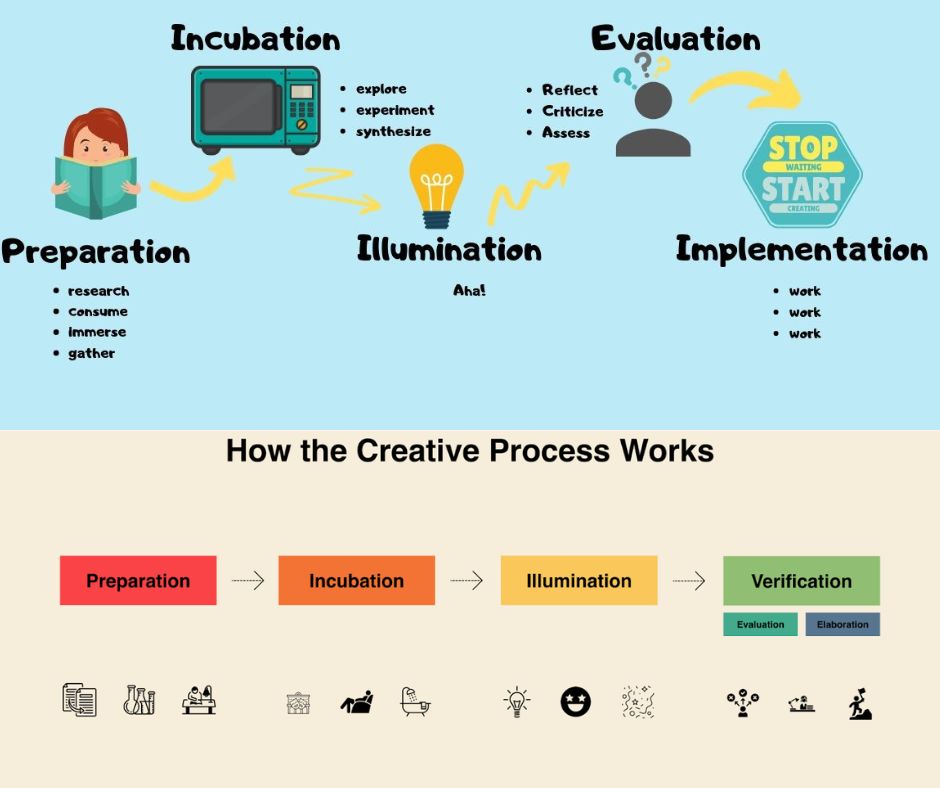
Creativity is a fascinating and elusive phenomenon that has captivated the human imagination for centuries. Whether you're an artist, a writer, an entrepreneur, or anyone with a desire to create something new, understanding the creative process is essential. In this blog post, we will delve deep into the stages of creativity, from the spark of inspiration to the final execution of a creative endeavor. By unraveling these stages, we hope to shed light on the mystery of creativity and offer insights that can help you harness your creative potential.
The creative process often begins with a moment of inspiration—a spark that ignites the creative flame. Inspiration can strike at any time, triggered by a variety of sources. It might come from a book, a conversation, a piece of art, or simply observing the world around you. This initial idea or concept is the seed from which your creative endeavor will grow.
Nurturing Inspiration: Keep a journal or digital note-taking tool to capture ideas as they come. Engage in activities that stimulate your mind, like reading, traveling, or exposure to new cultures.
Once you have your initial idea, it's time to prepare and gather the knowledge and resources necessary for your project. This stage often involves research, brainstorming, and planning. You'll dive deeper into your topic, explore relevant literature, and map out your creative journey.
Research: Dive into books, articles, interviews, and online resources related to your idea. Seek to understand your subject from various angles.
Brainstorming: Generate a multitude of ideas, concepts, and approaches. Encourage free thinking and creative exploration.
Planning: Create an outline or a roadmap for your project. Define your goals, milestones, and timelines.
This stage may seem like a passive one, but it's essential for the creative process. During incubation, your subconscious mind continues to work on your project even when you're not actively thinking about it. This can lead to sudden insights and breakthroughs.
Allowing Space: Give your mind the space it needs to process information. Take breaks, meditate, or engage in unrelated activities to let your subconscious work.
Illumination is the moment of sudden clarity or insight when a solution or a creative breakthrough emerges. It's the proverbial "Eureka!" moment. This phase often feels magical, but it's the result of your subconscious processing and connecting ideas.
Capture Insights: Always have a way to capture your insights when they occur. Keep a notebook or digital recorder handy to document your "Aha!" moments.
With your newfound insight, it's time to critically evaluate your idea or solution. This stage involves scrutinizing your work, refining your concept, and assessing its feasibility. You may need to make adjustments and refinements.
Feedback: Seek feedback from peers, mentors, or experts in the field. They can provide valuable perspectives and help you refine your idea.
Prototype: If applicable, create a prototype or draft to test your concept and identify areas for improvement.
Elaboration is where you flesh out your idea, giving it substance and form. This stage requires dedication and hard work as you translate your concept into a tangible creation, be it a painting, a novel, a business plan, or any other creative output.
Dedication: Dedicate focused time and effort to your project. Consistency is key to bringing your idea to life.
Iterate: Be open to making iterative improvements as you progress. Creative projects often evolve during the elaboration phase.
In this stage, you put your creation to the test. You seek feedback from a broader audience or target users and refine your work based on their responses. Verification is crucial for ensuring your creation meets its intended purpose and resonates with your audience.
User Testing: If applicable, involve users or readers to provide feedback and uncover any usability or content issues.
Refinement: Use feedback to make necessary adjustments and refinements.
The final stage is all about putting the finishing touches on your creation. It involves polishing, editing, and ensuring every detail is in place. Completion is the bridge that takes your project from a work in progress to a finished masterpiece.
Editing and Proofreading: Pay meticulous attention to details, grammar, and formatting if you're working on written content.
Quality Assurance: Test your creation thoroughly to ensure it functions as intended.
The last stage of the creative process involves presenting your creation to the world. Whether it's publishing a book, launching a product, or exhibiting artwork, this step is about sharing your work with your target audience.
Marketing and Promotion: Develop a strategy to reach your audience effectively. Use social media, websites, or marketing campaigns to generate interest.
The creative process is a journey of self-discovery, exploration, and expression. It's not a linear path but rather a series of interconnected stages that require patience, dedication, and an open mind. By understanding and embracing each phase—from inspiration to execution—you can navigate the creative process with confidence and produce work that reflects your unique vision and creativity. Whether you're an artist, a writer, an entrepreneur, or simply someone looking to infuse more creativity into your life, this process serves as a roadmap for turning inspiration into reality. So, go forth and create, for the world awaits your unique contributions.
